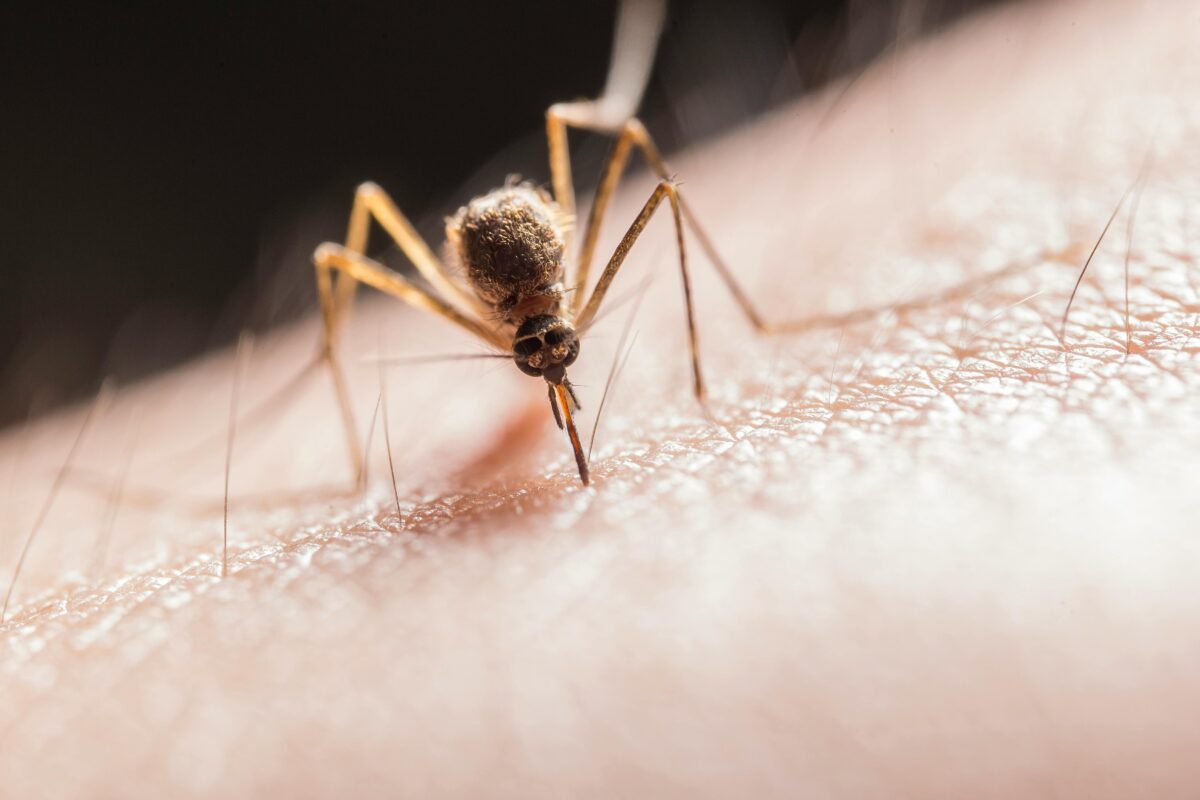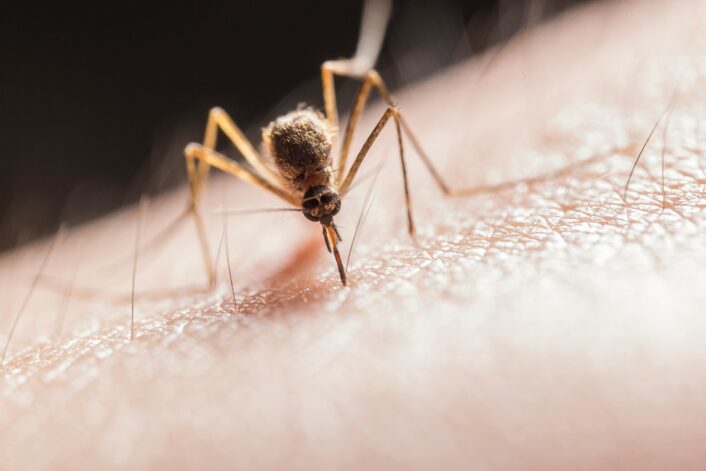Do You Attract Mosquitoes? Your Genetics May Be to Blame
harvey
on
April 11, 2024

Latest Posts
Table of Contents
Do You Attract Mosquitoes? Your Genetics May Be to Blame
Date of Content: March 2, 2024
Written by: Jess Gayo
Reviewed by: Maarit Tiirikainen, PhD
Overview
Have you ever wondered why mosquitoes seem to have a particular fondness for feasting on human blood and more on some individuals than others? The answer lies in a complex interplay of evolutionary biology and sensory mechanisms. Understanding the factors that attract mosquitoes to humans is crucial for developing effective strategies to mitigate the spread of mosquito-borne diseases.

Why are Mosquitoes Attracted to Humans?
Mosquitoes’ attraction to humans stems from a combination of factors deeply rooted in their biology and evolutionary history. One major aspect is the odor emitted by humans, specifically the carbon dioxide we exhale. Mosquitoes have highly sensitive receptors that detect even small concentrations of CO2, guiding them toward potential hosts. Additionally, body heat serves as another indicator for mosquitoes, helping them pinpoint warm-blooded animals like humans.
But it’s not just about smell and warmth; mosquitoes are also drawn to certain chemicals present in human sweat, such as lactic acid and ammonia. These compounds act as cues for mosquitoes searching for a blood meal. Furthermore, the type of bacteria residing on our skin can influence our attractiveness to mosquitoes. Research suggests that certain bacteria and viruses produce odors that mosquitoes find irresistible.
Interestingly, genetics may also play a role in determining an individual’s attractiveness to mosquitoes. Studies have shown that some people are genetically predisposed to produce higher levels of certain chemicals that mosquitoes find appealing, making them more susceptible to bites. Understanding these mechanisms is crucial for developing effective strategies to minimize mosquito bites and control the spread of mosquito-borne diseases.
Are Mosquito Bites Dangerous?
Mosquito bites might seem like mere nuisances, causing itching, redness, and swelling, but they can carry serious health risks. Mosquitoes are notorious vectors for transmitting a variety of diseases, making their bites potentially dangerous. One of the most well-known diseases spread by mosquitoes is malaria, caused by Plasmodium parasites transmitted through the bite of infected Anopheles mosquitoes. Malaria alone claims hundreds of thousands of lives each year, predominantly in tropical regions.
Aside from malaria, mosquitoes can also transmit viruses like dengue, Zika, chikungunya, West Nile virus, and various types of encephalitis. These diseases can range from mild illnesses with flu-like symptoms to severe conditions that may lead to neurological complications, birth defects, or even death.
Moreover, scratching mosquito bites can introduce bacteria into the skin, leading to secondary infections. For individuals with allergies to mosquito saliva, bites can trigger allergic reactions ranging from mild itching to severe anaphylaxis.
While mosquito bites may seem benign, they pose significant health risks due to the potential transmission of deadly diseases and the possibility of secondary infections and allergic reactions. Taking measures to prevent mosquito bites, such as using insect repellent and wearing protective clothing, is crucial for safeguarding against these dangers.
What Can Affect Your Attractiveness to Mosquitoes?
Genetic Factors
A 2017 study delved deep into the genetic factors influencing human interactions with mosquitoes. By conducting the first genome-wide association studies (GWAS) on mosquito-related traits, the study identified significant associations between self-reported mosquito bite reactions, itchiness caused by bites, and perceived attractiveness to mosquitoes.
Specifically, 8 independent genetic associations were discovered with mosquito attractiveness: enriched for immunity-related genes involved in cytokine signaling pathways. The strongest associations were with genetic variants in genes such as HLA-DRA (SNP rs9268659), IL21-AS1 (SNP rs309403), and ACSL6/IL3. These genes also play crucial roles in the body’s immune response to mosquito bites.
Environmental Factors
Several environmental factors can influence a person’s attractiveness to mosquitoes, dictating who becomes the unfortunate target of their persistent bites. Understanding these factors can help individuals take proactive measures to reduce their risk of mosquito encounters.
- Temperature and Humidity: Mosquitoes thrive in warm and humid environments. Higher temperatures and humidity levels can increase mosquito activity and their attraction to hosts. Additionally, mosquitoes are more active during dawn and dusk when temperatures are cooler but still warm enough for their activity.
- Standing Water: Mosquitoes require water for breeding, and stagnant or standing water provides the ideal breeding grounds for many mosquito species. Common sources include ponds, puddles, ditches, and even water collected in outdoor containers like flower pots or gutters. Eliminating standing water around homes and communities can reduce mosquito populations and their attraction to the area.
- Vegetation and Landscaping: Mosquitoes often rest in dense vegetation during the day and may seek refuge in shrubs, bushes, and tall grasses. Landscaping features that provide shade and moisture, such as dense foliage or overgrown vegetation, can create attractive habitats for mosquitoes. Properly maintaining yards and trimming vegetation can help reduce mosquito resting sites.
- Presence of Other Animals: Mosquitoes feed on the blood of various animals, not just humans. The presence of animals like birds, mammals, and livestock in the vicinity can attract certain mosquito species. Additionally, breeding sites favored by animals, such as bird baths or pet water bowls, can contribute to increased mosquito activity.
- Airflow and Wind Patterns: Mosquitoes are relatively weak fliers and rely on still or slow-moving air currents to navigate. Windy conditions can disrupt their flight patterns and make it more challenging for mosquitoes to locate hosts. However, strong winds may also carry mosquitoes over longer distances, potentially introducing them to new areas.
- Urbanization and Development: Urban areas with dense populations and extensive infrastructure can create microclimates that are conducive to mosquito breeding and survival. Factors such as artificial water bodies (e.g., ornamental ponds), inadequate drainage systems, and abandoned properties can contribute to increased mosquito populations in urban environments.
- Chemical Pollution: Some research suggests that chemical pollutants, such as certain pesticides and industrial chemicals, may alter mosquito behavior and attractants. These pollutants can disrupt the ecological balance and potentially affect the attractiveness of humans to mosquitoes, although further studies are needed to fully understand this relationship.
By considering these environmental factors, individuals can take proactive steps to minimize their attractiveness to mosquitoes and reduce the risk of mosquito-borne diseases. Implementing mosquito control measures, such as eliminating standing water, maintaining landscaping, and using insect repellents, can help create a less hospitable environment for these pesky insects.
What Species of Mosquitoes are Attracted to Human Blood?
Several species of mosquitoes are known to be attracted to human blood, primarily to obtain a blood meal to nourish their eggs. Among the most notorious species are members of the genus Anopheles, which are responsible for transmitting malaria, a deadly disease caused by Plasmodium parasites. Anopheles mosquitoes are attracted to the carbon dioxide and body heat emitted by humans, making them efficient vectors for malaria transmission.
Another significant species is Aedes aegypti, which is responsible for spreading diseases such as dengue fever, Zika virus, and chikungunya. Aedes aegypti mosquitoes are attracted to human sweat and body odor, particularly the chemical compounds lactic acid and ammonia, which act as cues for locating potential hosts.
Culex mosquitoes, particularly Culex pipiens and Culex quinquefasciatus, are also attracted to human blood. These mosquitoes are vectors for diseases like West Nile virus and filariasis. They are drawn to carbon dioxide and other chemical cues emitted by humans.
The species of mosquitoes attracted to human blood vary depending on geographical location, environmental factors, and host availability. Understanding the behavior and preferences of these mosquito species is essential for implementing effective control measures to reduce their impact on human health.
What are the Symptoms of a Mosquito Bite?
Mosquito bites, though often considered minor nuisances, can result in a range of symptoms, varying in severity depending on factors such as individual immune response and the presence of transmitted pathogens. Here are the common symptoms associated with mosquito bites:
- Redness and Swelling: Shortly after being bitten, the affected area typically becomes red, swollen, and raised. This inflammatory response is the body’s natural reaction to mosquito saliva injected during feeding.
- Itching: Mosquito bites are notorious for causing intense itching due to the proteins present in their saliva. Scratching the bite can exacerbate itching and increase the risk of secondary infections.
- Pain or Discomfort: Some individuals may experience mild pain or discomfort at the site of the bite, particularly if the area becomes inflamed.
- Warmth: The bitten area may feel warm to the touch, especially during the initial inflammatory response.
- Hives or Rash: In sensitive individuals, mosquito bites can trigger an allergic reaction characterized by the development of hives or a widespread rash beyond the immediate bite site.
- Blisters: In rare cases, particularly severe reactions to mosquito bites can lead to the formation of small blisters filled with fluid.
- Systemic Symptoms: In instances where mosquitoes transmit pathogens, such as viruses or parasites, individuals may experience systemic symptoms. These can include fever, headache, body aches, fatigue, and in severe cases, neurological symptoms or organ damage depending on the specific disease transmitted.
While most mosquito bites result in mild symptoms that resolve within a few days, it’s essential to monitor for signs of infection or allergic reactions, particularly in vulnerable populations such as children, the elderly, and individuals with compromised immune systems. Applying topical anti-itch creams, taking antihistamines, and practicing proper wound care can help alleviate symptoms and prevent complications associated with mosquito bites.
What are the Treatments to a Mosquito Bite?
Treating mosquito bites promptly can help alleviate symptoms and prevent complications. Here are several effective treatments:
- Topical Anti-itch Creams or Lotions: Over-the-counter topical creams or lotions containing ingredients such as hydrocortisone, calamine, or menthol can provide relief from itching and inflammation associated with mosquito bites. These products work by reducing inflammation and blocking itch signals.
- Cold Compresses: Applying a cold compress or ice pack to the bitten area can help reduce swelling, numb the skin, and alleviate itching. Wrap the ice pack in a cloth to prevent direct contact with the skin and avoid potential ice burns.
- Oral Antihistamines: Oral antihistamine medications, such as diphenhydramine (Benadryl) or cetirizine (Zyrtec), can help relieve itching and reduce allergic reactions associated with mosquito bites. These medications work by blocking the action of histamine, a chemical released during allergic responses.
- Topical Calamine Lotion: Calamine lotion, containing a combination of zinc oxide and ferric oxide, has soothing properties that can help relieve itching and irritation caused by mosquito bites. Apply a thin layer of calamine lotion to the affected area and allow it to dry.
- Oatmeal Baths: Taking a lukewarm bath with colloidal oatmeal can provide relief from itching and inflammation associated with mosquito bites. Colloidal oatmeal has anti-inflammatory properties that help soothe irritated skin.
- Natural Remedies: Several natural remedies, such as aloe vera gel, tea tree oil, or witch hazel, may offer relief from mosquito bite symptoms. These remedies have anti-inflammatory and soothing properties that can help reduce itching and promote healing.
- Avoiding Scratching: Although tempting, scratching mosquito bites can exacerbate itching and increase the risk of secondary infections. Encourage gentle patting or tapping of the bitten area instead of scratching to minimize irritation.
- Seeking Medical Attention: In rare cases where mosquito bites result in severe allergic reactions (anaphylaxis) or secondary infections, seek medical attention promptly. Your healthcare provider may prescribe corticosteroid creams, oral antibiotics, or other treatments to address complications.
By utilizing these treatments and preventive measures, individuals can effectively manage mosquito bite symptoms and reduce the risk of complications associated with mosquito-borne diseases.
Ways to Repel Mosquitoes
Repelling mosquitoes is essential for preventing bites and reducing the risk of mosquito-borne diseases. Here are several effective methods supported by scientific research:
Use of Insect Repellents
Insect repellents containing active ingredients such as DEET (N, N-Diethyl-meta-toluamide), picaridin, IR3535, or oil of lemon eucalyptus (OLE) are highly effective at repelling mosquitoes. These repellents work by interfering with the mosquito’s ability to detect human hosts, thereby reducing the likelihood of bites. DEET, in particular, has been extensively studied and is recommended by organizations such as the Centers for Disease Control and Prevention (CDC) for protection against mosquitoes.
Wearing Protective Clothing
Wearing long-sleeved shirts, long pants, socks, and closed-toe shoes can help reduce exposed skin and minimize the risk of mosquito bites. Additionally, choosing clothing treated with permethrin, an insecticide, can provide added protection against mosquitoes.
Avoiding Peak Mosquito Activity
Mosquitoes are most active during dawn and dusk, so minimizing outdoor activities during these times can help reduce exposure to mosquito bites. If outdoor activities are unavoidable, use repellents and protective clothing to minimize the risk of bites.
Installing Screens and Netting
Installing window screens on doors and windows can help prevent mosquitoes from entering indoor spaces. Additionally, using mosquito nets around beds or outdoor seating areas can provide a physical barrier against mosquitoes.
Eliminating Standing Water
Mosquitoes require water for breeding, so eliminating sources of standing water around homes and communities can help reduce mosquito populations. Emptying and cleaning containers such as flower pots, bird baths, and gutters regularly can prevent mosquitoes from breeding in these areas.
Using Mosquito Traps
Mosquito traps can help reduce mosquito populations by attracting and trapping adult mosquitoes. These traps utilize various methods, such as CO2, heat, light, or chemical attractants, to lure mosquitoes into the trap, where they are subsequently captured or killed.
Planting Mosquito-Repellent Plants
Certain plants, such as citronella, marigolds, lavender, and basil, contain natural compounds that repel mosquitoes. Planting these mosquito-repellent plants in outdoor areas can help deter mosquitoes and reduce the likelihood of bites.
Avoiding Fragrances
Mosquitoes are attracted to strong scents, including perfumes, scented lotions, and fragrant soaps. Avoiding the use of heavily scented personal care products can help reduce attractiveness to mosquitoes.
Using Mosquito Coils and Candles
Mosquito coils and candles containing insecticidal compounds such as pyrethroids can provide temporary relief from mosquitoes when used in outdoor areas. These products release insecticidal vapors that repel or kill mosquitoes in the vicinity.
Utilizing Electronic Mosquito Repellent Devices
Electronic mosquito repellent devices, such as ultrasonic repellents or electronic mosquito repellent bracelets, claim to repel mosquitoes using sound frequencies or electronic signals. However, the effectiveness of these devices is debated, and scientific evidence supporting their efficacy is limited.
By incorporating these various repellent methods into daily routines and outdoor activities, individuals can effectively reduce their exposure to mosquitoes and minimize the risk of mosquito-borne diseases. It’s important to choose repellent methods that are safe and approved for use, particularly for vulnerable populations such as children and pregnant women.
LifeDNA’s Attractiveness to Mosquitoes Trait Report
Unlock the secrets of your genetic blueprint with LifeDNA’s Attractiveness to Mosquitoes Trait Report. Ever wondered why mosquitoes seem to target you more than others? Our comprehensive report provides insights into your genetic predisposition to mosquito attraction, helping you understand your body’s unique responses to these pesky insects.
But that’s just the beginning. Dive deeper into your wellness journey with LifeDNA’s scientifically-backed Wellness Report, offering a wealth of information tailored to your genetic profile. Explore traits like Appendicitis, Longevity, and Kidney Stone Predisposition, gaining valuable insights into your health and well-being.
With seven main categories and nearly 200 trait reports available, LifeDNA empowers you to take control of your health across various aspects of your life. With our other comprehensive Reports from Nutrition and Fitness to Sleep, Skin, Personality, and Cognition, our reports provide personalized recommendations to optimize your wellness.
Don’t wait any longer to start your wellness journey. Take the first step today with LifeDNA’s plans, and discover how understanding your genetic makeup can revolutionize your approach to your wellness and vitality. Your body is unique, and your wellness plan should be too. Unlock the power of your genes with LifeDNA.
Summary
- Mosquitoes are attracted to humans due to factors such as body heat, carbon dioxide emission, sweat chemicals like lactic acid and ammonia, and certain skin bacteria.
- Genetic predisposition plays a role in an individual’s attractiveness to mosquitoes, with some people producing higher levels of chemicals that mosquitoes find appealing.
- Understanding the genetic and immunological factors behind mosquito attraction is crucial for developing strategies to minimize mosquito bites and control disease transmission.
- Mosquito bites can transmit diseases like malaria, dengue fever, Zika virus, and West Nile virus, posing serious health risks to individuals.
- Symptoms of mosquito bites include redness, swelling, itching, pain, warmth, hives, rash, blisters, and systemic symptoms like fever and headache.
- Treatments for mosquito bites include topical anti-itch creams, cold compresses, oral antihistamines, oatmeal baths, natural remedies, and seeking medical attention for severe reactions.
- Environmental factors like temperature, humidity, standing water, vegetation, animal presence, airflow, urbanization, and chemical pollution can affect an individual’s attractiveness to mosquitoes.
- Effective mosquito repellent methods include using insect repellents, wearing protective clothing, avoiding peak mosquito activity, installing screens and netting, eliminating standing water, using mosquito traps, planting mosquito-repellent plants, avoiding fragrances, using mosquito coils and candles, and utilizing electronic mosquito repellent devices.
References
- https://www.webmd.com/a-to-z-guides/news/20230522/mosquitoes-attracted-to-humans-stinky-cheese-smell-study-says
- https://www.nih.gov/news-events/nih-research-matters/how-mosquitoes-detect-people
- https://www.houstonmethodist.org/blog/articles/2022/jun/why-are-mosquitoes-attracted-to-some-people-more-than-others/#:~:text=How%20much%20you%20sweat,and%20ammonia%20found%20in%20it.
- https://www.nbcnews.com/science/weird-science/mosquitos-sniff-hosts-infected-certain-viruses-researchers-find-rcna36304
- https://academic.oup.com/hmg/article/26/7/1391/2983548?login=false
- https://www.cdc.gov/malaria/about/malaria_spreads.html#:~:text=Only%20female%20Anopheles%20mosquitoes%20can,the%20next%20person%20she%20bites.
- https://www.cdc.gov/dengue/index.html
- https://www.cdc.gov/zika/prevention/transmission-methods.html#:~:text=Zika%20virus%20is%20transmitted%20to,spread%20dengue%20and%20chikungunya%20viruses.
- https://www.cdc.gov/chikungunya/index.html
- https://www.hopkinsmedicine.org/health/conditions-and-diseases/west-nile-virus#:~:text=West%20Nile%20virus%20is%20spread%20to%20humans%20through%20the%20bite,species%20also%20have%20the%20virus.
- https://www.cdph.ca.gov/Programs/CID/DCDC/CDPH%20Document%20Library/MBEFactSheet.pdf
- https://www.aaaai.org/tools-for-the-public/conditions-library/allergies/taking-a-bite-out-of-mosquitoes#:~:text=At%20its%20worst%2C%20a%20mosquito,associated%20with%20other%20stinging%20insects.
- https://www.orkin.com/pests/mosquitoes/when-are-mosquitoes-most-active
- https://www.slocounty.ca.gov/Departments/Health-Agency/Public-Health/Department-News/What-You-Need-to-Know-Mosquitoes-Love-Standing-Wat.aspx
- https://academic.oup.com/jme/article/60/4/698/7140308
- https://www.cdc.gov/mosquitoes/about/life-cycles/anopheles.html
- https://www.ecdc.europa.eu/en/disease-vectors/facts/mosquito-factsheets/aedes-aegypti
- https://www.cdc.gov/mosquitoes/about/life-cycles/culex.html
- https://www.cdc.gov/mosquitoes/mosquito-bites/symptoms.html
- https://www.mayoclinic.org/diseases-conditions/mosquito-bites/diagnosis-treatment/drc-20375314
- https://www.medicalnewstoday.com/articles/mosquito-bite-cream
- https://www.ncbi.nlm.nih.gov/pmc/articles/PMC2564222/
- https://my.clevelandclinic.org/health/drugs/23338-calamine-lotion
- https://www.healthline.com/health/outdoor-health/home-remedies-for-mosquito-bites
- https://www.cdc.gov/malaria/resources/pdf/fsp/repellents_2015.pdf
- https://www.dynatrap.com/articles/what-time-of-day-are-mosquitoes-most-active#:~:text=Many%20types%20of%20mosquitoes%20prefer,could%20easily%20suffer%20from%20dehydration.
- https://www.gardendesign.com/plants/mosquito-repellent.html
- https://malariajournal.biomedcentral.com/articles/10.1186/s12936-018-2412-4
Customer Reviews




*Understanding your genetics can offer valuable insights into your well-being, but it is not deterministic. Your traits can be influenced by the complex interplay involving nature, lifestyle, family history, and others.
Our reports and suggestions do not diagnose or treat any health conditions or provide any medical advice. Consult with a healthcare professional before making any major lifestyle changes or if you have any other concerns about your results.
- Category: Wellness



